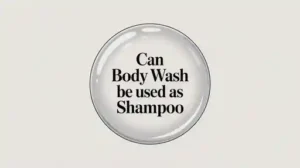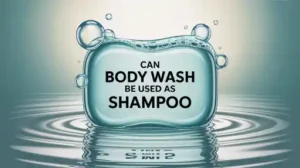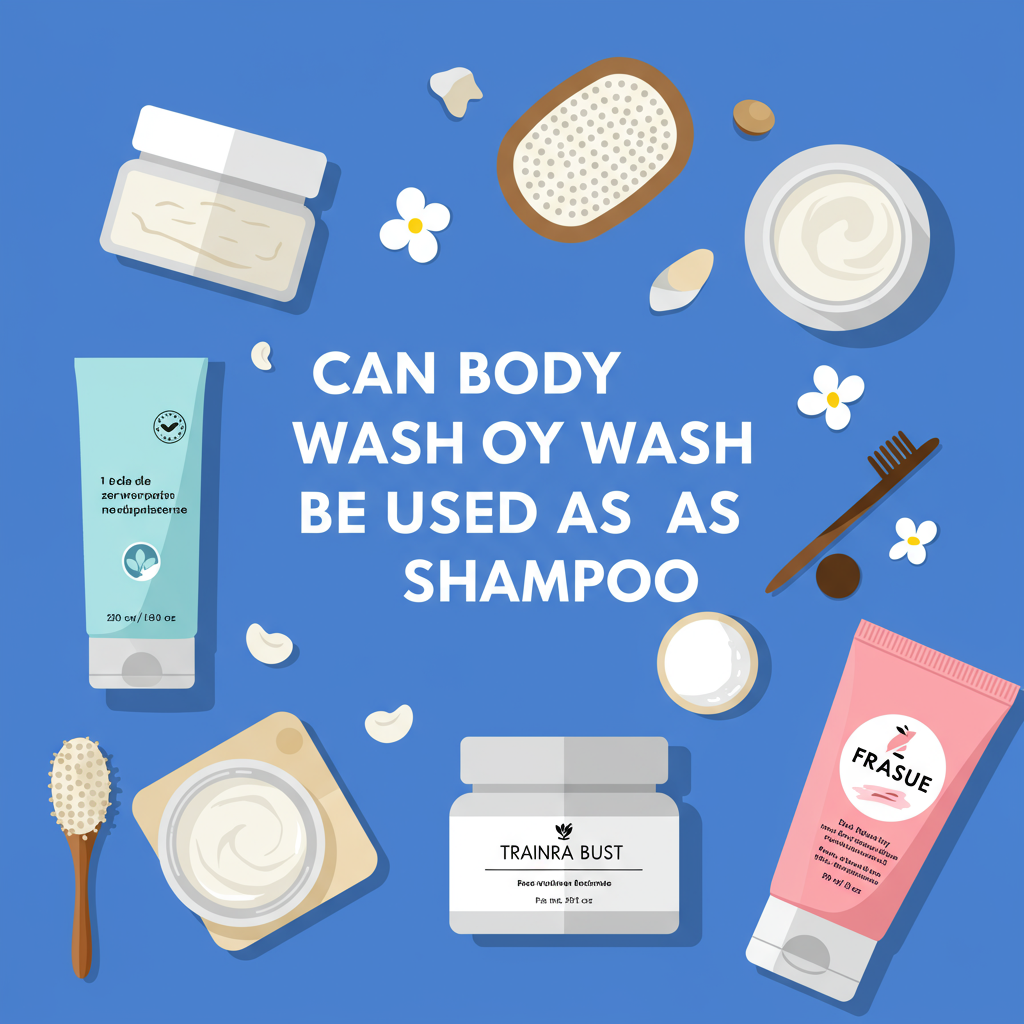We’ve all been there: standing in the shower, reaching for the shampoo, only to realize the bottle is empty. Your eyes then drift to the body wash, and a burning question pops into your mind: Can body wash be used as shampoo? It’s a common dilemma, especially when traveling, in a hurry, or simply trying to simplify your shower routine. While the idea of a single product for all your cleansing needs is appealing, the reality is a bit more nuanced.

This comprehensive guide will unravel the mystery, exploring the fundamental differences between body wash and shampoo, the potential benefits and drawbacks of using body wash on your hair, and what you can expect if you do. We’ll provide practical advice for emergency situations, discuss the long-term implications, and offer better alternatives. By the end, you’ll have a clear understanding of whether using body wash as shampoo is a viable option for you, ensuring your hair stays healthy and happy.
Understanding the Basics: Body Wash vs. Shampoo
Before we answer the burning question, “Can body wash be used as shampoo?”, it’s crucial to understand that these two products, while both cleansers, are formulated for very different purposes. They are designed to interact with distinct parts of your body, each with unique needs and compositions.
Key Differences in Formulation
The primary distinction lies in their ingredient profiles. Manufacturers meticulously select surfactants, conditioning agents, and other additives to optimize performance for either skin or hair.
What’s in Body Wash?
Body washes are formulated to clean the skin, which typically has larger pores and is more resilient than the delicate scalp.
- Stronger Cleansing Agents: Body washes often contain more robust surfactants (e.g., Sodium Laureth Sulfate, Sodium Lauryl Sulfate) designed to remove dirt, sweat, and body oils effectively from the skin.
- Moisturizing Ingredients: To counteract the drying effects of stronger cleansers, body washes frequently include a higher concentration of emollients, humectants, and occlusives (e.g., glycerin, petrolatum, shea butter) to keep skin hydrated and soft.
- pH Level: Body washes are generally formulated to match the skin’s natural pH, which is slightly acidic (around 5.5).
- Fragrance: Many body washes boast strong, lingering fragrances designed to leave your skin smelling fresh.
What’s in Shampoo?
Shampoos, on the other hand, are crafted to cleanse the hair and scalp without stripping natural oils excessively, and to prepare the hair for conditioning.
- Milder Surfactants: Shampoos often use gentler surfactants (e.g., Sodium Cocoyl Isethionate, Cocamidopropyl Betaine) to cleanse the scalp and hair without over-drying or causing irritation.
- Targeted Conditioning Agents: They contain specific ingredients (e.g., silicones, polyquaternium compounds) that help detangle, add shine, reduce frizz, and improve hair manageability, often with less residue than skin moisturizers.
- pH Level: Shampoos are typically formulated to be slightly acidic (around 4.5-5.5) to help smooth the hair cuticle and reduce frizz.
- Specialized Ingredients: Depending on the shampoo’s purpose (volumizing, color-safe, anti-dandruff), it will contain specific ingredients to address those concerns.
- Lighter Feel: Shampoos are designed to rinse cleanly from hair, leaving it feeling light and not weighed down.
So, Can Body Wash Be Used As Shampoo? The Short Answer
In a pinch, yes, body wash can technically be used as shampoo. It will create lather and cleanse your hair to some extent. However, it’s generally not recommended for regular use due to the significant differences in formulation that can negatively impact your hair and scalp health. Think of it as using dish soap to wash your hands – it’ll clean them, but it’s not ideal for long-term skin health.
When It Might Be Okay (The “Pros”)
There are specific scenarios where using body wash on your hair might be a justifiable, albeit temporary, solution.
Emergency Situations
If you’re in a hotel, at a friend’s house, or camping and realize you’ve forgotten your shampoo, body wash can serve as a temporary substitute to cleanse your hair and remove visible dirt and oils. It’s better than having visibly dirty hair for an important meeting or event.
Minimalist Travel
For ultralight travelers who want to carry as few liquids as possible, a small bottle of a very gentle, multi-purpose body wash might seem like a practical choice. However, even then, consider dedicated shampoo bars or 2-in-1 products formulated for hair and body.
Certain Hair Types
Individuals with very oily, fine hair might find that a body wash effectively strips excess oil. However, this often comes at the cost of dryness and potential damage over time. Those with extremely short hair might experience fewer adverse effects, as their hair is less prone to tangling and accumulation of product residue.
Why You Should Think Twice (The “Cons” and Risks)
While using body wash as shampoo might seem harmless in the short term, consistent use can lead to a host of problems for your hair and scalp.
Scalp and Hair Health Concerns
- Dryness and Irritation: The stronger surfactants in body wash can strip the natural oils (sebum) from your scalp and hair, leading to a dry, itchy, and irritated scalp. This can also make your hair feel brittle and rough.
- Dullness and Lack of Shine: Without the specific conditioning agents found in shampoo, your hair cuticles may not lie flat, resulting in dull-looking hair that lacks natural shine.
- Frizz and Tangling: Body washes are not designed to smooth the hair cuticle or provide detangling properties. This can lead to increased frizz, knots, and difficulty combing through your hair, especially for those with longer or textured hair.
- Residue Buildup: The heavier moisturizing ingredients in body wash, while great for skin, can leave a waxy or greasy residue on your hair, making it feel heavy, limp, and dirty even after washing.
- Color Fading: For color-treated hair, the harsher detergents in body wash can accelerate color fading, diminishing the vibrancy of your dye job.
- Potential for Breakage: Dry, tangled hair is more prone to breakage, especially when brushing or styling.
Ingredient Mismatch
The ingredients optimized for skin may not be suitable for hair. For example, strong fragrances or certain botanical extracts that are beneficial for skin might cause irritation or allergic reactions on a sensitive scalp.
Aesthetic Consequences
Ultimately, your hair likely won’t look or feel its best. It might appear greasy, frizzy, dull, or simply “off.” This can be particularly noticeable for those with specific hair concerns like curls, fine hair, or very dry hair.
Practical Advice for Occasional Use
If you absolutely must use body wash as shampoo in an emergency, here are a few tips to minimize potential damage:
Patch Test First
If you have a very sensitive scalp, try a small amount of the body wash on a discreet area of your scalp first to check for irritation before applying it all over.
Dilute If Possible
Mix a small amount of body wash with water in your palm before applying it to your hair. This can help reduce the concentration of harsh surfactants and make it less stripping.
Focus on the Scalp
Concentrate the product mainly on your scalp to cleanse the roots, and let the lather gently run down the lengths of your hair. Avoid vigorously scrubbing the ends.
Rinse Thoroughly
Rinse your hair much more thoroughly than usual to ensure no residue from the body wash is left behind. This is crucial for preventing a heavy, greasy feel.
Follow Up with Conditioner
Always, always follow up with a conditioner if you have one available. This is essential to restore moisture, detangle, and smooth the hair cuticle after the potentially harsh cleansing from the body wash.
Better Alternatives to Body Wash for Hair
Instead of asking “Can body wash be used as shampoo?”, consider these more hair-friendly options for those emergency moments or for simplifying your routine:
Hotel Shampoo/Conditioner
Most hotels provide small bottles of shampoo and conditioner. While not always top-tier, they are specifically formulated for hair and are a far better choice than body wash.
Multipurpose Bars
Many brands now offer solid shampoo bars or all-in-one cleansing bars that are explicitly designed for both hair and body. These are often made with milder ingredients and are great for travel.
Dry Shampoo
If your hair isn’t excessively dirty but just needs a refresh, dry shampoo is an excellent non-wash alternative. It absorbs oil and adds volume without water.
Gentle Facial Cleansers
Some very mild, fragrance-free facial cleansers can be a better emergency option than body wash, as they are typically designed for sensitive skin and contain gentler surfactants. However, they may not provide much lather.
Recommended Products
Dr. Bronner’s Pure-Castile Bar Soap
A classic multi-purpose soap, known for its versatility. While not a dedicated shampoo, its gentle formulation (especially unscented versions) makes it a better emergency option for both body and hair than many conventional body washes. Remember to follow with an acidic rinse (like diluted apple cider vinegar) to balance hair’s pH if using regularly.
Travel Size Shampoo & Conditioner Set
For those who frequently travel, investing in a good quality travel-size shampoo and conditioner set is a superior alternative to relying on body wash. These kits ensure your hair gets the specific care it needs, even on the go, preventing “Can Body Wash Be Used As Shampoo” emergencies.
Neutrogena Anti-Residue Clarifying Shampoo
If you’ve had to use body wash on your hair, a clarifying shampoo can help remove any heavy residue left behind. Use this once a week or as needed to deep clean your scalp and hair, restoring its natural balance and lightness after an emergency body wash application.
Frequently Asked Questions (FAQ)
Q1: Is body wash bad for your hair?
Yes, generally speaking, body wash is not ideal for your hair. Its formulation often contains stronger cleansing agents and heavier moisturizers designed for skin, not hair. These can strip natural oils from your scalp, leading to dryness and irritation, and leave a heavy, dulling residue on your hair, making it prone to frizz, tangles, and breakage over time.
Q2: What happens if you accidentally use body wash as shampoo?
If you accidentally use body wash as shampoo once or twice, your hair will likely feel clean but might also feel a bit dry, rough, or heavy. It may be harder to comb, appear dull, or develop more frizz. Your scalp might also feel slightly dry or itchy. The effects are usually temporary and can be mitigated by following up with a good conditioner and returning to regular shampoo.
Q3: Can I use 2-in-1 body wash for my hair?
“2-in-1” products usually refer to shampoo and conditioner combinations, or sometimes body wash and shampoo. If a product is explicitly labeled as a “body wash and shampoo” or “hair and body wash,” it’s formulated to be safe for both. However, even these multi-purpose products may not perform as well as dedicated shampoo and conditioner for specific hair types or concerns. Always check the label carefully.
Q4: What’s the difference between shower gel and shampoo?
Shower gel is essentially another term for body wash, designed for cleansing the skin. Like body wash, shower gels typically contain stronger surfactants and more skin-specific moisturizers and fragrances than shampoo. Shampoo, conversely, is formulated with gentler cleansers and conditioning agents optimized for the hair and scalp, aiming to clean without stripping and to improve hair texture and manageability.
Q5: How can I fix greasy hair after using body wash?
If your hair feels greasy or heavy after using body wash, the best course of action is to re-wash it with a proper shampoo, focusing on thoroughly cleansing your scalp and rinsing completely. Follow up with a good conditioner on the ends. For stubborn residue, a clarifying shampoo can be very effective in removing buildup and restoring your hair’s lightness and shine.
Conclusion: Think Twice Before You Lather Up Your Locks with Body Wash
The question, “Can body wash be used as shampoo?”, has a straightforward answer: while possible in a dire emergency, it’s certainly not recommended for regular use. The distinct formulations of body wash and shampoo cater to the unique needs of your skin and hair, respectively. Using a product designed for your body on your delicate hair and scalp can lead to dryness, irritation, residue buildup, and an overall dull, unhealthy appearance.

Prioritizing your hair’s long-term health means using products specifically crafted for it. Keep a travel-sized shampoo on hand, explore multi-purpose bars, or opt for dry shampoo when you’re in a pinch. If you do find yourself in an unavoidable situation where you must use body wash, remember our practical tips: dilute, focus on the scalp, rinse thoroughly, and always follow with a conditioner. Your hair will thank you for the extra care!
